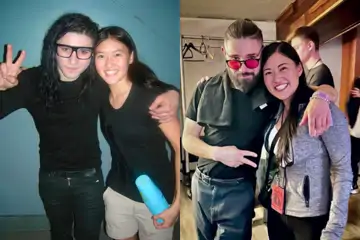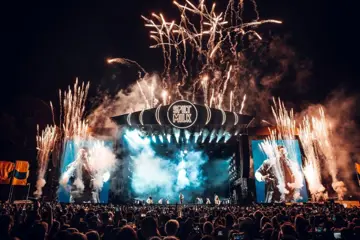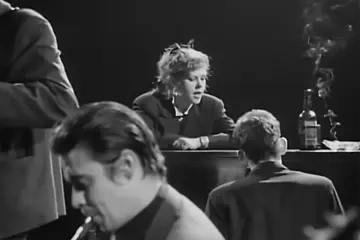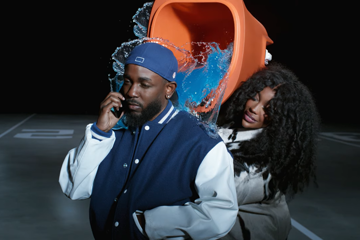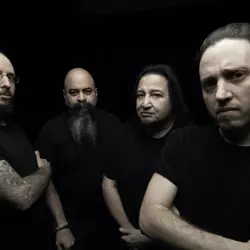 Fear Factory
Fear Factory“Me and Burt [C Bell, vocals] wanted to create the fucking ultimate hybrid of industrial metal,” Fear Factory guitarist Dino Cazares says when asked about the main goal they wanted to achieve with 1995's game-changing Demanufacture album. “I mean, combined with great songs. [On 1992 debut] Soul Of A New Machine, we had so many extra riffs and we kinda just threw them all in there and just put it on the record. Whereas with Demanufacture, we kept a lot of those extra riffs out and made these great songs. Me and Burton had so many different musical backgrounds. We liked so much different stuff, from gothic and industrial to alternative music – the early Nirvana, Sub Pop era – all that stuff; Helmet too. Everything from Sepultura to death metal stuff; we kinda made the ultimate hybrid of everything that we liked and created our own thing.”
Demanufacture, the US metallers' second full-length, surfaced amid a vastly different climate within heavy music and the planet at large. Infusing influences from Godflesh and Napalm Death, Soul Of A New Machine was a polarising, yet vital album, introducing industrial touches and clean vocals to the death metal format. However, it was but a teaser for the follow-up. Stripping away much of the death metal overtones, Demanufacture showcased Fear Factory morphing into a cold, taut and mechanical entity. The jackhammer-like delivery was heavier than a sack of anvils, sound-scapes eerily atmospheric while the songs bristled with irresistibly catchy hooks. The man-versus-machine lyrical theme also became one of their defining characteristics. The record also introduced them to legions of new fans – even scoring their first gold record worldwide in Australia.
The band arrived at Demanufacture following the underground success of Soul Of A New Machine and 1993's Fear Is The Mindkiller EP, whereby they reworked a number of songs from their debut. “It was Fear Is The Mindkiller that really helped us, like, see the [big] picture,” the axeman explains. “When we did Soul Of A New Machine we had 17 songs and we put them all on the record. Obviously that was a lot of songs. We trimmed a lot of the fat; we trimmed a lot of the unnecessary stuff that was on Soul Of A New Machine and our songwriting obviously got better.
“When we started to go into the remix EP Fear Is The Mindkiller… That helped us a lot, because [remixer] Rhys Fulber had all the technology that me and Burt couldn't afford. 'Cause we were just pretty much in a one-bedroom apartment living with five dudes. Pretty much scrounging around, living in Hollywood, having minimum wage jobs and we just couldn't really afford a lot of the keyboards, the computers and the technology stuff that Rhys Fulber had. So bringing him into the picture during Fear Is The Mindkiller, he was able to bring that to Demanufacture. Me and Burt really wanted it; we wanted it from the beginning, but we couldn't afford it. He definitely brought that into the studio and we were able to create Demanufacture.”
However, there was one obstacle to overcome if the band – which at the time also comprised drummer Raymond Herrera and bassist Christian Olde Wolbers, both of whom are no longer in the ranks – was to realise their creative ideals. The band clashed with producer Colin Richardson, who had manned the desk for Soul Of A New Machine. His concept for the band's future creative direction didn't mesh with the members of Fear Factory.
“He had a completely different vision,” Bell recalls. “He didn't understand that… So we parted ways. He did a mix and that didn't work out, so we parted ways and then had Greg Reely and Rhys Fulber mix it.”
“This is where Fear Is The Mindkiller comes in again,” Cazares swiftly adds. “Me and Burt saw, 'Okay, Rhys Fulber is the guy that has this stuff; we can go to the next level with this album'. We felt that we had moved past what Colin's idea was of how the album should sound. So unfortunately we were locked into a contract with Colin for the second album, with Demanufacture, but obviously things didn't work out. [We] decided to make a power move and we ended up unfortunately having to fire Colin Richardson 'cause it didn't work out and we brought Rhys Fulber and Greg Reely into the picture. They saw the same vision that we did and that's why we were able to take Demanufacture to the next level.”
An integral aspect of the band achieving their creative aims was Demanufacture's machine-like precision; keeping everything as locked and razor-sharp tight as possible. However, this was largely by necessity. “That was something that we developed at the beginning, as again we couldn't really afford samplers,” Cazares explains. “Like most industrial bands, they take a riff or they take a sound and they copy it. They sample it and they loop it and chop it, loop it and chop it. We really couldn't afford that stuff, so we kinda like did it, just with guitar and drums and just like emulating what a sampler would sound like, with the riff that's chopped, or a beat that's chopped.
“Like if you take the first song off of Soul Of A New Machine, Martyr,” he says, sounding out the intro. “It just sounds like it's chopped – and that's what we wanted to do – and we kinda created this machine-like sound, but naturally. Another perfect example is the song Self Bias Resistor on Demanufacture,” he continues, humming away again to further illustrate his point. “It's just a well-oiled machine; really tight and it's just repeating over and over again and just sounds like a loop. That's how we created like a KMFDM, kind of Slayer riff,” he chuckles. “It's like we were trying to simulate a sampler, but we couldn't afford it. We just did it ourselves.”
Another staple element of their sound was the mixed vocal approach. The infusion of clean singing into the death metal/grindcore field on Soul Of A New Machine was initially met with a mixed response from extreme music fans, but paved the way for countless other acts to follow in their wake. The harsh vocals featured on Demanufacture often eschewed the fully-fledged growl displayed on its predecessor in favour of a well-honed, yet still vicious roar. The clean tones also adopted a more refined approach.
“Soul Of A New Machine, when we were writing that record, that was pretty much the first time I was ever actually writing songs in a band where I was really trying to do something,” the frontman begins. “That was my first time really doing vocals for a band. So we were writing the songs and then… I was trying to find my voice. When the first record came out, we started touring and we toured with all different types of bands. Touring with death metal bands, but also with a lot of hardcore bands – Sick Of It All, Madball. We played with Agnostic Front… I realised my voice had developed based on what I was influenced and inspired by. So when the next record came out, I had more of a confidence about what I was writing about and what I was trying to achieve.”
Bell is asked how he feels about many pundits viewing him as a pioneer of such a vocal style. “It's real cool, you know? I'm inspired by a lot of different types of artists as well. This was my attempt at emulating those artists in this form and it became our own signature. When the clean vocals started coming out during Soul Of A New Machine, it was like, 'What?' I almost did it as a joke and Dino was like, 'That style's really cool, keep doing – keep doing it'. I was like, 'Okay'. It became a signature that, in the way where I would start singing when I would hear a melody in my head. Dino's riffs are very heavy-duty and I would hear a melody within the chorus that he was playing. And I would just try to sing the melody that I would hear in my head… His playing and what I was singing would just come together and that's what inspires me to sing – to come out with this clean vocal and mixing the two together. I never thought about how to do it, I just did it.”
Adding further depth was Demanufacture's subject matter – an apocalyptic tale depicting a futuristic world whereby a man leads the human resistance in a battle against the all-powerful, all-conquering machines. Sound familiar, perhaps? “Dino and I had seen, while we were writing Soul Of A New Machine and afterwards, we lived together for so long, we would watch all the same movies,” Bell remembers. “Like Apocalypse Now, The Terminator, Full Metal Jacket, RoboCop, Blade Runner. We started taking these words and titles from different movies and we would like sample some of the dialogue into our music.
“We always wanted to write the soundtrack to an apocalyptic sci-fi movie that hadn't yet been written. So that was what Demanufacture was going to be; like the soundtrack to a futuristic sci-fi, apocalyptic world. So we started [incorporating] that concept within the lyrics and the title. After the record was done and we went to mix it, the label came to me and said, 'Hey, the press kind of want of explanation of what all the songs mean'. So instead of like writing a description of exactly what the songs meant, I decided to turn it into a story. So each song became a sole paragraph about a 'hero' in a futuristic time fighting against the machines – which was the establishment – and also being a part of something that is kind of like an anarchistic type of [movement].”
Also playing a role were the real-life events within their hometown, unfolding in front of the members' eyes. That mix of tension, uncertainty and frustration is certainly channelled into the record itself. “The trial, the riots, the earthquake,” the singer recounts. “It was just high tension everywhere – and you could feel it. There was kind of an anxiety about what people were going to do. The tension was so thick you could really cut it with a knife in the air; everywhere, all over LA. People were just real tense. LA was on fire man, it was on fire,” he chuckles.
“From '92 to '95 there was a lot of stuff going on in LA,” Cazares adds. “We had the Rodney King riots and the trial. We saw the National Guard on the streets; everybody had to be inside by ten o'clock at night. I remember me and Burt staying on the roof of our apartment building and seeing people with guns out there, just trying to protect their businesses and stuff like that; people looting. It was crazy. We definitely saw the destruction of LA and we definitely knew… Just from the actions of what people were doing, we knew there was a change. We needed something new, a change. And that change and that tension really inspired Demanufacture; because on the record, there's obviously someone fighting for a change.”
Change was what the record brought about within what was then a rapidly evolving heavy music landscape. The band remembers the initial critical reaction to Demanufacture being universally positive. “The reviews were amazing all across the board,” the guitarist tells TheMusic. “I remember everything was like five out of five, ten out of ten; 100 out of 100. It was just something new for people. A lot of people hadn't heard of anything like that. There was nothing out there like that.
“We had our own sound, our own vibe; everything was new to a lot of those people who were listening… At that time, '95 was when death metal was on its way out. A lot of the extreme metal was on its way out. People were waiting for something new and that's what it was. Demanufacture was the beginning of a new era.”
Cazares reckon he first noticed the record's widespread impact and influence when the band was asked to tour with Ozzy Osbourne. “It was like, 'Okay, somebody is noticing. The industry is noticing'. If Ozzy is asking you to do a tour worldwide with him, that's when it was like, 'Okay, wow, Sharon Osbourne's on our radar... That's pretty good'.”
The praise from the press, enhanced record sales and the Osbourne family's approval aside, it wasn't long before many distinguishable elements of the band's sound began to be borrowed and even outright stolen by countless other metal acts. “I think one of the main things that's really noticeable in all different forms of metal, all different genres of metal, (is) the vocal style is probably the most noticeable one,” Cazares ponders. “Ever since the growling and the melodic choruses, heavy verses, ever since Burt did that, that's been… Even though at the beginning when Burt first did it on Soul Of A New Machine, because of the genre of music that we tagged into, the death metal scene, a lot of people didn't like it.
“A lot of people didn't like it at first, but it grew on people; people started to love it. And then obviously from there, it started a whole new thing and now in it's in everything. There's not a band right now that I can think of that hasn't tried it, or hasn't done it for a few songs, or hasn't done a whole album, or created their own album with that same vocal style. It's just become… I've heard other people try to claim it, but I know that we were before those bands,” he laughs. “I should have trademarked it, that's what I should have done,” Bell quickly chimes in, also chuckling.
“And the guitar; the syncopated guitars and kick-drums,” Cazares continues. “I mean, Metallica's probably the closest band that I can think of that really did that, with a song called One,” he adds, humming away yet again. “I wanted to take that and try and fucking… Again, it was trying to emulate a machine, trying to emulate a sampler, trying to make the kicks and the guitars as one for a whole record, as compared to Metallica doing it for a piece of one song. It was basically inspired from that. But we just wanted to emulate a machine, an engine.”
Said machine certainly clicked into gear, as Fear Factory took to the world's stages in support of the record. Tours with the likes of Ozzy Osbourne and Iron Maiden ensued, and although their initial 1996 visit to Australia was cancelled after just one show due to Bell's illness, the mainstream media coverage of the riot at the Sydney venue only boosted their profile here. The guitarist also cites their appearance at the 1997 Big Day Out as a critical moment in pushing their popularity over the edge on these shores. But even at the time of the record's release the band never performed it in its entirely; something Australian fans will be the first to witness in July. Some of said tracks haven't been played live in many years, or ever before.
Fear Factory would experience greater commercial fortunes and even more lucrative touring opportunities via their 1998 follow-up Obsolete, prior to bitter falling outs, friendships repaired, a departure from long-time label Roadrunner and more drama. However, they have arguably never quite captured the same balance of aggression, ambience and hooks.
Not that the band are resting on such laurels. How does the pair feel about it being considered their “magnum opus” or “classic record”? “I'm proud of it,” the vocalist enthuses. “It's a great record and I'm extremely fine with that. A lot of bands have their record. Metallica has their Master Of Puppets, Pantera's Vulgar Display Of Power, Slayer has Reign In Blood – and we've got our Demanufacture. It put them on the map as a ground-breaking band.”
Cazares, fittingly, gets the last word. “I one hundred per cent agree with that,” he says. “But that doesn't mean that we can't write another classic record.”





